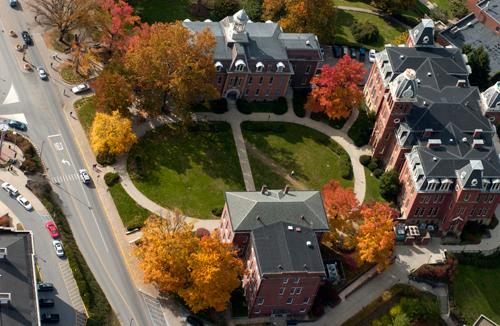Hispanics going to college in record numbers, but graduation numbers still lag
More Hispanics in the United States are choosing to attend college, but their graduation rates still lag their non-Hispanic peers. (Photo by Wvuuam via Wikimedia Commons.)
Hispanics in the United States are entering colleges and universities at higher rates than whites and blacks, but still lower than Asian Americans.
This is an all-time high for Hispanics, according to the Pew Hispanic Center, which released a report late last week. This is the result, in part, of a dramatic rise in the high school graduation rate among Hispanic high-school students.
That’s the good news. The bad news is that once in college, Latino students still lag when it comes to earning bachelor’s degrees.
Hansi Lo Wang, who covers race, ethnicity and culture for NPR’s Code Switch project, said Latinos, who currently make up about 17 percent of Americans, will represent about 33 percent of Americans by 2060. Sandra Martinez, a 30-year-old woman who works in a Maryland community center, said many Latinos feel like college isn’t something that’s available to them.
“For me, when I was younger, growing up, that was never mentioned. There was no more higher dream after high school,” she said. “Now, the kids becoming more Americanized … it’s helping.”
Martinez is going to college now, but the younger students she’s working with now are thinking about college as the logical next step from high school, Wang said.
“This shows that there’s a long-term rise in Hispanic students going into college,” he said.
There are several theories for why more Hispanics are going to college, not the least of which is that it’s becoming increasingly difficult for high school students to find jobs after graduating. But Marcelo Suárez-Orozco, dean of UCLA’s graduate school of education, has another theory.
“I think the story here is really the story of the maturing of the second generation,” he said. “These are U.S.-born kids. They’re kids who have higher ambitions, they want to do better than their parents, and they’re connecting with colleges.”
But even as their rate of participation increases, Hispanic and Latino students are still having trouble completing their degrees.
Wang said these Latino college students are facing challenges that are familiar to all students, not the least of which is the high cost of a college degree.
But nonprofits, like the Maryland community center where Martinez works, are trying to address this issue through education.
“If I know that I did that and it was possible for me without the guidance of my parents, of anything, it’s possible for them,” she said.
